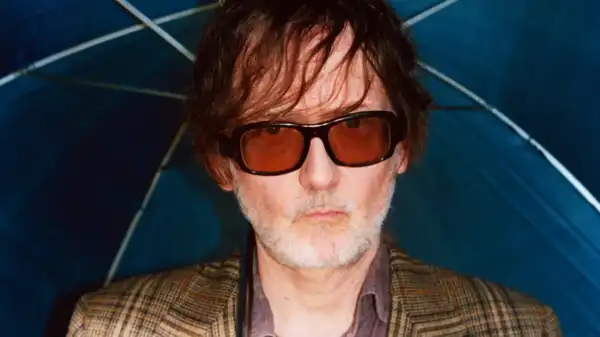
Save this storySave this storySave this storySave this story
This month, beloved British pop band Pulp will release More, their first new album in twenty-four years. Founding frontman Jarvis Cocker has been busy with a host of exciting projects in the interim – an album with his band Jarv Is, collaborations with Wes Anderson and Chilly Gonzalez, a BBC radio show, a remarkable memoir, Good Pop Bad Pop – but Pulp’s new album feels like a major return, at once triumphant and humble. Opener “Spike Island” strikes a friendly, self-deprecating tone (“I exist / To do this / To scream and point,” Cocker sings), and the rest of the tracks are saturated with Cocker’s signature half-serious, conversational style, playful imagery that feels right at home in 2025. (“Please stay in touch with me / In this contactless society.”) On “Grown Ups,” he mentions that life is a journey, not a destination, wondering, “But what if you get motion sickness along the way / Before you even leave the station?” Elsewhere, he sings, “Instead of giving us this slow death / We should give ourselves a slow jam.” At their best, Cocker’s songs can feel like communal grooves, and dancing is an equally apt way to respond to life’s joys and sorrows.
Cocker grew up in Sheffield, in north central England, with his mother and sister; his father left when Jarvis was seven. He formed the first incarnation of Pulp at the age of fifteen. At a local event, he passed a demo tape to John Peel, a prominent British radio presenter and tastemaker; Peel’s producer called two weeks later, and Pulp were off and running. After releasing several albums in the 1980s, the band achieved huge popularity in the 1990s Britpop scene thanks to their catchy melodies, danceable rhythms, and Cocker’s witty, observant lyrics dealing with class consciousness, sex, and the absurdity of human existence, culminating in the anthemic “Common People”. By the late 1990s, Pulp’s fame had become too much for Cocker, and the band went on hiatus in 2002. They have performed sporadically since then, notably their 2012 farewell concert in Sheffield was captured in the 2014 film Pulp: A Film About Life, Death and Supermarkets.
Cocker’s book, Good Pop, Bad Pop, published in 2022, is built around stories inspired by various objects he kept in his basement. A notebook from his youth in which he outlined how Pulp would change music as we know it. (“The band would have to break through to the public by making reasonably conventional but slightly unconventional pop songs. Once they had achieved fame and commercial success, the band could then begin to disrupt and reshape both the music business and music itself.”) A 1985 newspaper cutting (“Cocker Comes a Cropper”) about the time he fell out of a window while trying to impress a woman with a party stunt, leading to injury and an artistic breakthrough. A Polaroid of his first electric guitar, given to him when he was 13 by his mother’s boyfriend, a German scuba diving instructor they met on holiday in Ibiza. The memoirs are not exhaustive or chronological; they consist of bursts of inspiration, carefully pieced together.
In the same spirit, perhaps, Cocker and I recently visited MOMA, where we viewed two exhibitions made up of fragments of things – The Robert Frank Album and The Clock, Christian Marclay’s MFA film collage – and then went to the National Arts Club, where we talked about life, art, the new Pulp album, and the passage of time. Our conversation has been edited for length and clarity.
[Cocker begins.] Have you heard this record?
Yeah, that’s great. I was listening to it in the Rough Trade office.
I did the same – they showed it to everyone at the Rough Trade office and I went.
So when you listened to it the first time, you were with them?
Well, I started it up and went downstairs. It was an open-plan office, so I could hear it and I didn’t have to look at people while they were listening. At one point I stuck my head out and said, “That’s the end of side one.” Because I still think of it as two sides. A side of an LP is a good chunk of time to listen to something. CDs are always too long.
And then there’s the formlessness of the digital age, where you just listen to everything in any order…
And there is no order in anything. Maybe this is the future. I saw a photo taken inside an Amazon warehouse, and it is just a mess, everything is mixed up. Things are not put in their proper places.
Sourse: newyorker.com